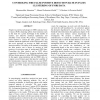Free Online Productivity Tools
i2Speak
i2Symbol
i2OCR
iTex2Img
iWeb2Print
iWeb2Shot
i2Type
iPdf2Split
iPdf2Merge
i2Bopomofo
i2Arabic
i2Style
i2Image
i2PDF
iLatex2Rtf
Sci2ools
ISBI
2004
IEEE
2004
IEEE
Controling The False Positive Detection Rate In Fuzzy Clustering of fMRI Data
Despite its potential advantages for fMRI analysis, fuzzy C-means (FCM) clustering suffers from limitations such as the need for a priori knowledge of the number of clusters, and unknown statistical significance and instability of the results. We propose a randomizationbased method to control the false positive rate and estimate statistical significance of the FCM results. Using this novel approach, we develop an fMRI activation detection method. The ability of the method in controlling the false positive rate is shown by analysis of false positives in activation maps of resting-state fMRI data. Controlling the false positive rate in FCM allows comparison of different fuzzy clustering methods, using different feature spaces, to other fMRI detection methods. In this paper, using simulation and real fMRI data, we compare a novel feature space that takes the variability of the hemodynamic response function into account (HRFbased feature space) to the conventional cross-correlation analys...
False Positive Rate | FMRI Activation Detection | FMRI Detection Methods | ISBI 2004 | Medical Imaging |
| Added | 20 Nov 2009 |
| Updated | 20 Nov 2009 |
| Type | Conference |
| Year | 2004 |
| Where | ISBI |
| Authors | Hesamoddin Jahanian, Hamid Soltanian-Zadeh, Gholam-Ali Hossein-Zadeh |
Comments (0)

